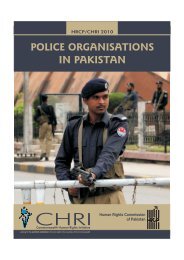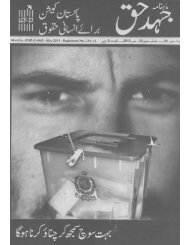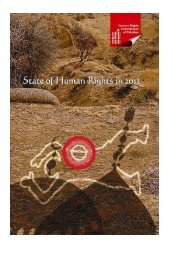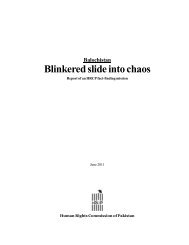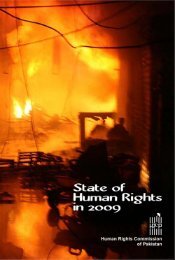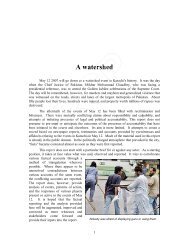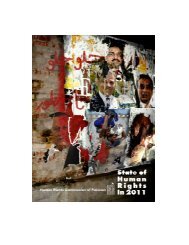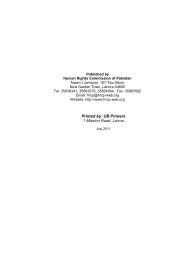Download PDF file - Human Rights Commission of Pakistan
Download PDF file - Human Rights Commission of Pakistan
Download PDF file - Human Rights Commission of Pakistan
- No tags were found...
You also want an ePaper? Increase the reach of your titles
YUMPU automatically turns print PDFs into web optimized ePapers that Google loves.
Annexures 129Zila Nazim regarding police functions except administration, investigation and prosecution. In the case <strong>of</strong> conflictbetween the Zila Nazim and government the decision <strong>of</strong> the provincial government shall prevail.There is a debate about whether this method <strong>of</strong> checks and balances has worked because <strong>of</strong> the three tiers<strong>of</strong> control: federal, provincial and district/local. Police is a provincial department which is accountable to the ChiefMinister but complaints about the police can be made to the Zila Nazim. The various processes and flows <strong>of</strong>information at multiple levels needs be strictly formulated and followed in order for this check and balance to work.New institutions established under Police Order, 2002Mr. Khosa also discussed with the group the various institutions that have been created by the Order: District, Provincial and National Public Safety <strong>Commission</strong>s (PSCs are least effective and need tobe more transparent)Independent Police Complaints Authority at the provincial and national levels (has not been created)Criminal justice coordination committee at district levelNational Police Management BoardMr. Khosa stated that the NPSC is functioning and oversees the functioning <strong>of</strong> provincial commissions.Unfortunately, the IG can be shifted on the whims <strong>of</strong> the Chief Executive and so the role <strong>of</strong> insulating the police frompolitics has been taken away from the NPSC. NPSC functions can be found in Article 92 <strong>of</strong> the Order.National Police Management Board functions can be found in Article 160 <strong>of</strong> the Order. This is a new bodywhich meets twice a year and recommends the recruitment and training needs <strong>of</strong> the police to the government.According to Mr. Khosa a fundamental change has been the introduction <strong>of</strong> checks and balances to thepolice in the law for the first time. He reiterated that there is no section in law that gives unbridled power to the policeand there are punishments for police <strong>of</strong>ficers who overstep their powers.Penalties for police <strong>of</strong>ficersPenalty for misconduct by police <strong>of</strong>ficers - Up to 3 yrs imprisonmentPenalty for vexatious entry, search, arrest, torture etc - Up to 5 yrs imprisonmentPenalty for delay in producing arrested person in court – Up to 1 yr imprisonmentVarious Control Mechanisms under the OrderSuperintendence: By the Provincial Government with regards to Policy and DirectionAdministration: The Order empowers the IG only for administration and operational purposesDemocratic control: District Police is responsible to the Nazim and the various Public Safety <strong>Commission</strong>sIn his conclusion, Mr. Khosa said that the best accountability has to come from within the police. Unfortunately,since the inception <strong>of</strong> <strong>Pakistan</strong> the institutions have followed the law <strong>of</strong> the ruler and not the rule <strong>of</strong> law.Quoting a July 2008 report by the ICG (International Crisis Group), Mr. Khosa said that as an immediate firststep to bringing about positive reform in the police force, the amendments made to the Order in 2004 must beremoved accompanied by a change in the mindset <strong>of</strong> the political executive.Further, steps should be taken to empower the various PSCs (Public Safety <strong>Commission</strong>s) so that transfers,postings and recruitment are done solely on merit. The PSCs were created to insulate the police from politics but achange in the constitution <strong>of</strong> commission members has resulted in a tilt towards ruling party members.Finally, Mr. Khosa emphasised the importance <strong>of</strong> civil society for police reforms in <strong>Pakistan</strong>.Presentation by Jawad Dogar, Additional IG, Punjab:Mr. Dogar further discussed the purpose and effects <strong>of</strong> the Order with the participants <strong>of</strong> the consultation.



